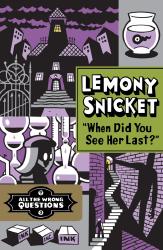As someone who teaches courses in editing and book culture, I am always looking for thoughtful writing about how readers interact with books. Adam Gidwitz’s essay “Books for Life” discusses how we may be identified by our favourite children’s books. He comes to an unexpected but striking conclusion:
When a child asks for the same book three hundred times, she is telling her parents what she needs to learn, what she needs to come to terms with.
-
 “When Did You See Her Last?”
“When Did You See Her Last?”
“Why do you think I won’t like it?” a friend asked after I described a book I had read and liked but said he wouldn’t enjoy. I have been reaching for an answer, because simply saying It’s a feeling I have is insufficient. But Virginia Woolf, whose writing I adore, has provided a reason:
This is an important book, the critic assumes, because it deals with war. This is an insignificant book because it deals with the feelings of women in a drawing-room.
When I was in my teens I read John Steinbeck’s novel East of Eden, an assigned text that propelled me into studying the Modernists and Modernism generally. You may remember that the key to the novel is the word timshel:
But the Hebrew word, the word timshel — ‘Thou mayest’ — that gives a choice. It might be the most important word in the world. That says the way is open.
Returning to one of my long-term interests, this time in the context of literature and analysis. This article has really struck a chord, personally and academically.
Academically, gifted girls are usually precocious readers. The National Association for Gifted Children’s (2006) position statement on early childhood states that characteristics of young gifted children include early reading skills and advanced vocabulary, and most of the gifted eminent adult women were precocious readers whose talent was nourished at an early age (Kerr, 1997).
This excerpt comes from an urban fantasy series about libriomancers, people who are able to use books to produce magic. It expresses, in a tidy rhetorical figure, a feeling I’ve always had about books and reading but never been able to articulate.
I had said before that all stories were magic. It had never occurred to me that all magic was stories.
Jim C. Hines, Unbound (New York: Daw Books, 2014), p.
“… reading is a partnership between the reader and the text, and the text is less susceptible to tattering and shredding.”
— Margaret Mackey, forthcoming